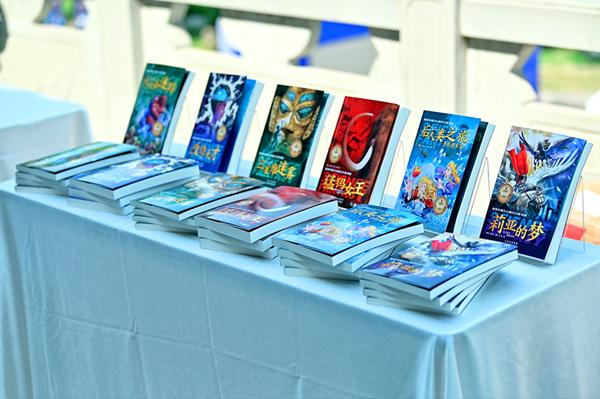Children's sci-fi awards showcase genre's robust growth in China
The 3rd annual Children's Science Fiction Nebula Awards ceremony, held on Friday in Guanghan, Sichuan province, served as a stage to honor the winners and as a testament to the strong growth of children's sci-fi literature.
Dong Renwei, a prominent figure in Chinese sci-fi and a founder of the Awards, spotlighted the evolution of China's children's science fiction industry during his opening speech. He acknowledged the expansion of the genre, now boasting over 100 writers that include professionals, part-timers, and both mainstream and literary authors. Furthermore, he highlighted the surge in the number of publishing houses and magazines dedicated to children's science fiction. This year's awards ceremony and convention were held with the intention of displaying the industry's accomplishments after a decade of dedication.
"Children's science fiction, bearing a distinctive Eastern style, has truly blossomed in China," he stated.
The awards ceremony was attended by more than 200 leading figures of China's sci-fi circle, including Ma Chuansi, Chao Xia, Lu Yang, Jiang Bo, Cheng Jingbo, Han Song, Yao Haijun and Shao Ruoyu.

The 3rd annual Children's Science Fiction Nebula Awards winners were unveiled on Friday night, with six main prizes taking the spotlight. Peng Liurong's "The Radiant Dust" secured the gold award for the medium and long novel category. Meanwhile, Zuo Wenping's "The Circular Girl" clinched the gold award for the short story category and the New Star gold award. Ma Chuansi garnered the gold award for the most influential writer, Wang Weiying took the gold for editing, and Xu Yanli seized the gold for science fiction literary criticism.
During the ceremony, the jury president, Professor Cui Xinping from Taiyuan Normal University, a children's literature critic, extolled Peng Liurong's "The Radiant Dust" for its "grand imagination and lofty conception." Meanwhile, Yao Haijun, honorary chairman of the awards organizing committee, lauded Ma Chuansi, who since 2015 has produced over 20 distinctive science fiction pieces that blend childlike innocence, vibrant fantasy, and heartfelt emotion.
Significantly, the Children's Science Fiction Nebula Awards has created special awards to foster a diverse range of children's science fiction. For instance, Li Shanshan won the gold award for works aimed at young children with "Machine Girl," Bao Shu won the gold award for teenage sci-fi work with "Extinct Ancient Continent," and Jiang Yongyu secured the gold award for science popularization-style sci-fi with "Earth Crisis."

Book signings and promotional activities punctuated the Children Science Fiction Convention, with eight series of children's sci-fi books making their debut or receiving a promotion. These included several books edited by prominent Chinese sci-fi authors Liu Cixin and Dong Renwei.
In addition, an affiliated forum took place, drawing together sci-fi experts, critics, editors, publishers and writers. They convened to explore the various schools and styles of children's sci-fi, as well as its central themes and artistic techniques. The participants also advocated for a broader development of children's literature in the future.
Professor Cui Xinping unveiled the "2021-2022 Annual Report on Children's Science Fiction" at the forum, revealing that the genre's development in the past two years has demonstrated a rise in creative output, increased participation from publishers, initial advancements in children's sci-fi literature criticism and research, and burgeoning social interest.

The children's sci-fi awards ceremony and convention served as a curtain-raiser to the 14th Chinese Nebula Awards, the premier sci-fi awards in China, scheduled for Saturday.